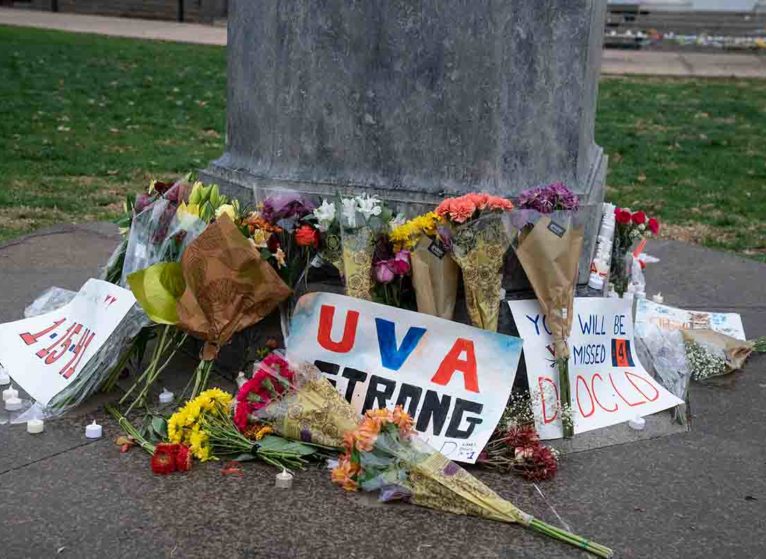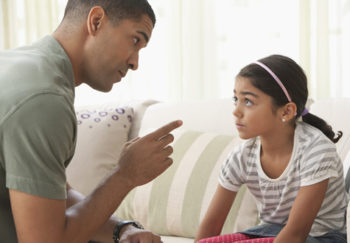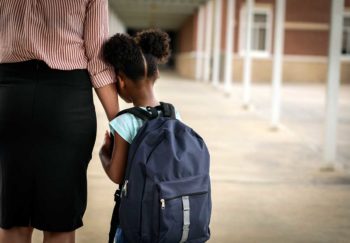Editor's note: We published this post in August 2017. We're updating it after the tragic shooting at the University of Virginia that killed three people and injured two others.
It's not easy to talk to children about frightening events such as the recent violence in Charlottesville, but this is one of the most important things you can do as a caring adult. Discussing these events in developmentally-appropriate language can help children feel safer and more secure, while also letting them know you are available and supportive. Don’t be afraid to talk to them! They need you, too.
Starting a Difficult Conversation
In an NBC29 story, Claudia Allen, MD, recommends staying as calm as you can.
Kids "read our emotions and our nonverbals, and they take their cue from us as to whether they should be afraid or not. So, you want to present yourself to them in a fairly calm manner, then what you want to do is you want to stick to the truth. This is not the time for white lies," she says.
Here are some other tips for your conversations:
- Plan ahead — Your child will want to know how he or she will be affected and whether or not your family will be safe. Have answers ready for these questions.
- Find a quiet place — Talk in a quiet, comfortable place without distractions such as the television.
- Take time to listen — Find out what your child knows. Ask, "What have you heard about this?" This will help you know what to discuss to help your child feel safe and give you the chance to correct any misinformation.
- Share your feelings — It is OK to let children know how you feel. This gives you a chance to show them it is possible to be upset and pull yourself together to carry on.
- Convey calm and security — Children take cues from caregivers and other important adults. They will be more likely to feel safe if you model a sense of calm and security even in the middle of being upset yourself.
Developmental Guidelines
Younger Children (8 & under)
- Keep the story simple and broad.
- Watch for themes related to the events in their play.
Older Children (8-12)
- Keep it fairly simple but with added, non-graphic details. For example, you might explain simply what the protests were about or say that some people also got hit by a car and one woman was killed.
Teenagers
- Start by asking what they know. Then explain any key pieces that they have wrong or are missing.
- Expect discussions of details, right versus wrong, etc.
- Be respectful even if you disagree with their beliefs.
Helping Children Cope with Violence
Teen psychologist Haley Stephens, PhD, says, "It's important to set time limits," on your news and media consumption. "It's important to limit how you get news, to just check a few credible news sources." The same goes for your kids. Images from the event can be upsetting, especially when seen repeatedly.
You can also:
- Keep up normal routines and activities.
- Spend extra time with them and tell them you love them.
- Let them know what you and other adults are doing to keep them safe.
- Do something to make a positive difference. Some ideas include donating to local charities, writing letters or making cards, and attending community events.
- Go to religious services or memorial observances.
Signs of Stress in Children
Your child might show some signs of stress after a frightening event. This is normal and usually not a sign of more serious problems if the signs do not last long. If they last more than a week or two, talk to your child’s main doctor or a child mental health professional.
Possible Stress Symptoms
- Moodiness
- Clinginess
- Nightmares
- Bedwetting
- Whining
- Tearfulness
- Easily annoyed
- Trouble with schoolwork
- Headaches
- Stomachaches
- Not feeling well
Take Care of Yourself, Too
Experiencing and talking about traumatic events can be exhausting. Be sure to do things that take care of yourself and lift your spirits in addition to taking care of your children.
More Information: Talking to Kids about Frightening Events
- How to Talk to Children about Difficult News (American Psychological Association)
- Explaining the News to Our Kids (Caroline Knorr, Common Sense Media)
- Talking to Children about Tragedies and Other News Events (American Academy of Pediatrics)
Race, Ethnicity, and Racial Bias
- Uplifting Families through Healthy Communication about Race: Parent Tip Tool (American Psychological Association)
- Talking to Children about Racial Bias (American Academy of Pediatrics)
Promoting Positive Development in Children
Sites That Help Kids Do Good (Common Sense Media)
How to Raise an Optimistic Human in a Pessimistic World (Caroline Knorr, Common Sense Media)
Creating Opportunities for Children and Teens to Contribute (American Academy of Pediatrics)
Helping Parents and Caregivers
Recovering Emotionally From Disaster (APA)
UVA pediatric psychologists prepared and contributed this information. Thank you to Boston Children’s Hospital Division of Psychology, who reached out to share information based on their team’s experiences with traumatic events.


